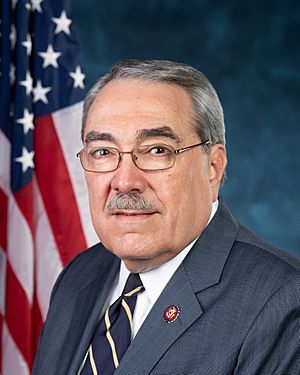G. K. Butterfield facts for kids
Quick facts for kids
G. K. Butterfield
|
|
|---|---|

Official portrait, 2019
|
|
| House Democratic Senior Chief Deputy Whip | |
| In office January 3, 2021 – December 30, 2022 |
|
| Leader | Nancy Pelosi |
| Preceded by | John Lewis |
| Succeeded by | Jan Schakowsky |
| Member of the U.S. House of Representatives from North Carolina's 1st district |
|
| In office July 20, 2004 – December 30, 2022 |
|
| Preceded by | Frank Ballance |
| Succeeded by | Don Davis |
| Chair of the Congressional Black Caucus | |
| In office January 3, 2015 – January 3, 2017 |
|
| Preceded by | Marcia Fudge |
| Succeeded by | Cedric Richmond |
| Associate Justice of the North Carolina Supreme Court | |
| In office February 5, 2001 – January 1, 2003 |
|
| Appointed by | Mike Easley |
| Preceded by | I. Beverly Lake Jr. |
| Succeeded by | Edward Thomas Brady |
| Personal details | |
| Born |
George Kenneth Butterfield Jr.
April 27, 1947 Wilson, North Carolina, U.S. |
| Political party | Democratic |
| Spouse |
|
| Children | 3 |
| Education | North Carolina Central University (BA, JD) |
| Military service | |
| Allegiance | |
| Branch/service | |
| Years of service | 1968–1970 |
| Rank | Specialist |
George Kenneth Butterfield Jr. (born April 27, 1947) is an American lawyer and retired politician. He was a member of the Democratic Party. From 2004 to 2022, he served as a U.S. Representative for North Carolina's 1st congressional district.
Butterfield has worked for many years to protect people's civil rights. In 2001, he was appointed to the North Carolina Supreme Court. He was also a member and former chair of the Congressional Black Caucus, a group of African American members of Congress.
In November 2021, Butterfield announced he would not run for reelection. He left his position in Congress on December 30, 2022, to work for a lobbying firm.
Contents
Early Life and Family
G. K. Butterfield was born in Wilson, North Carolina. At the time, the city was segregated, which meant Black and white people were kept separate by law. He came from a well-known Black family that had a long history in the state.
His mother, Addie, was a teacher for 48 years. She worked hard to make sure her students learned how to read. His father, Dr. G. K. Butterfield Sr., was a dentist who came to the U.S. from Bermuda. He served his community for 50 years.
In the 1940s, his father helped start a local branch of the NAACP. This group worked to help Black people register to vote. In 1953, his father became the first African American elected to the city council in Wilson.
Education and Military Service
Butterfield graduated from Charles H. Darden High School in Wilson. He then studied political science and sociology at North Carolina Central University (NCCU), a historically black university.
While in college, he was active in helping people register to vote. He organized voter registration events and student marches to raise awareness about voting rights. After college, he attended the NCCU School of Law and earned a law degree in 1974.
During college, Butterfield was drafted into the United States Army. He served from 1968 to 1970 and was stationed at Fort Bragg in North Carolina. After his service, he returned to NCCU to finish his degree.
Career as a Judge
After law school, Butterfield worked for 14 years as a civil rights lawyer. He became known for winning important cases related to voting rights.
In 1988, he was elected as a Superior Court judge. For 12 years, he was in charge of court cases in 46 counties in North Carolina.
In 2001, Governor Mike Easley appointed him to the North Carolina Supreme Court. After losing an election for the seat in 2002, he returned to the Superior Court. He served as a judge until he decided to run for Congress in 2004.
Career in Congress
Butterfield was first elected to the U.S. House of Representatives in a special election on July 20, 2004. He filled the seat of Representative Frank Ballance, who had resigned. He served in Congress for 18 years, winning reelection many times.
Key Roles and Committees
In Congress, Butterfield served on several important committees, including:
- Committee on Energy and Commerce
- Committee on House Administration
He was also a member of the Congressional Black Caucus and served as its leader from 2015 to 2017.
Starting in 2007, Butterfield was chosen as a Chief Deputy Whip for the House Democrats. In this role, he helped create party policies and worked to make sure important laws were passed.
Political Views
Butterfield has worked on many issues during his time in Congress. He supported laws to protect the environment, like the American Clean Energy and Security Act. He believes in finding clean, domestic sources of energy.
As a strong supporter of civil rights, he helped renew the Voting Rights Act. This law protects the right of all citizens to vote. He also introduced a bill to recognize the enslaved people who helped build the U.S. Capitol.

Butterfield supported the Affordable Care Act, a law that aimed to make health care more available to Americans. He believes in fair taxes, with lower taxes for middle- and low-income families.
He has a strong record of supporting equal rights. He voted against job discrimination based on sexual orientation and voted to end the "Don't Ask Don't Tell" policy in the military.
In 2014, he introduced a resolution to approve a memorial for the more than 5,000 enslaved and free Black people who fought for independence in the American Revolution.
Personal Life
Butterfield has three daughters: Valeisha, Lenai, and Tunya. He also has four grandsons. He is a lifelong member of the Jackson Chapel First Missionary Baptist Church in Wilson.
He serves on boards for the North Carolina Central University School of Law and Gallaudet University. In 2017, the city of Greenville, North Carolina, named its new bus station the G.K. Butterfield Transportation Center in his honor. In 2024, a part of Interstate 95 and the Wilson train station were also named after him.
See also
- List of African-American United States representatives
- North Carolina Democratic Party
 | Jewel Prestage |
 | Ella Baker |
 | Fannie Lou Hamer |


